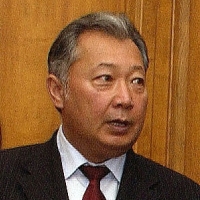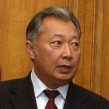
Bakiyev Confident Ahead of Presidential Election
Publication: Eurasia Daily Monitor Volume: 6 Issue: 112
By:

Approximately one month before the presidential election in July, Kyrgyzstan’s incumbent leader Kurmanbek Bakiyev has clearly emerged as its most likely winner. The president has managed to strengthen his personal leverage over the parliament, the Central Elections Commission (CEC) as well as the security structures in the run up to the election. The opposition, in the meantime, has become increasingly fragmented and inconsistent in their declared policy goals.
Earlier this year, when Bakiyev first announced staging an early presidential election, opposition forces saw a fresh opportunity to challenge the regime. However, as time elapsed, the opposition’s hopes for ousting Bakiyev faded. A series of violent attacks against opposition members and journalists, lawsuits and political assassinations allegedly staged by the supporters of the regime, exposed Bakiyev’s zeal to retain his grip on power. Today, some opposition members now appear resigned to Bakiyev winning the forthcoming election.
The opposition leaders hoped to pressure Bakiyev to cancel his candidacy prior to the election. But the leaders of the United Opposition Movement (UOM), uniting several major political parties, were unable to gather large crowds, even for their regional party meetings due to Bakiyev’s successful alienation of the opposition from the government and parliament.
“The people are not ready to come together in protest and we must use another way to challenge the regime,” concluded one member of the Ata Meken party. According to this view, the population is willing to tolerate Bakiyev’s regime despite his low popularity rating. “Akayev was ousted after almost 15 years of rule, with the last five years of his regime being deeply unpopular,” commented one member of the Ata Meken party referring to former president Askar Akayev who was forced to resign in spring 2005.
Other members of the UOM believe that Bakiyev will retain his presidency for many years to come. Both groups, however, agree that Bakiyev leaves the opposition with no other option but to remove him forcefully.
Yet, few UOM members admit that the opposition forces have failed to produce a coherent message that would prove popular among the politically active population. Instead, the same arguments about Bakiyev being a corrupt and undemocratic leader, intermixed with ethno-centric calls for patriotism, dominate the debate among opposition members. Aside from a few posters in public places, Almazbek Atambayev and Temir Sariyev, both presidential candidates from the opposition, did not communicate any sense of new policies they intend to introduce if elected.
The programs and reforms suggested by UOM fail to provide concrete strategies for reducing state corruption or contributing to the democratization process. One such program offered by the opposition sought to prevent any party from earning more than 60 percent, yet the proposal was undermined by its numerous loopholes. It did not, however, suggest any changes to the electoral process or a division of power among the state institutions.
In a desperate search for support, some UOM leaders called for mobilizing crowds to protest against the current regime on the basis of Kyrgyz ethnic identity. Their reluctance to formulate strategies beyond anti-corruption slogans and ethno-centric ideas, demonstrated the UOM’s faulty conviction in its own righteousness. UOM leaders rarely question their own means of fighting Bakiyev’s clan-based and criminal regime. Calls to unite on the basis of ethnicity, however, contributed to the ethnic minorities’ reluctance for greater political participation. As one UOM leader and a potential presidential candidate dangerously asserted, ethnic minorities in Kyrgyzstan are mere bystanders of political changes, while those born “Kyrgyz” are fighting the unjust political regime.
In the meantime, according to the leader of Ata Meken Omurbek Tekebayev, parliamentarians from the pro-regime Ak Zhol party were ordered to actively work with their constituencies (www.24.kg, June 9). He commented that “officials are meeting with their fellow villagers, bringing food, and butchering livestock,” to persuade them to vote for Bakiyev.
Bakiyev chose July to stage the elections in order to secure re-election prior to the government having to ration electricity production in the winter months. Last winter the government had to ration electricity in order to prevent the collapse of the hydropower sector. Bakiyev has also realized the importance of small and medium sized businesses in his presidential campaign. He has promised to protect businesses from illegal raids by the tax agencies (www.akipress.kg, June 10). This policy shift followed introducing the deeply unpopular patent system that affected small businesses last January.
Despite encountering numerous difficulties from the regime, the UOM will initiate their own independent count of the votes and closely work with the mass media on election day (www.24.kg, June 9). This effort is genuine, yet it is unlikely to result in any significant challenge to Bakiyev’s re-election ambitions. The president has announced he will bring more observers of his own.




